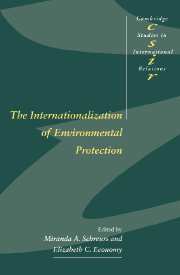Book contents
- Frontmatter
- Contents
- List of contributors
- Preface
- 1 Domestic and international linkages in environmental politics
- 2 Chinese policy-making and global climate change: two-front diplomacy and the international community
- 3 The domestic politics of global biodiversity protection in the United Kingdom and the United States
- 4 Domestic and international linkages in global environmental politics: a case-study of the Montreal Protocol
- 5 The internationalization of environmental protection in the USSR and its successor states
- 6 Domestic institutions and international environmental agendas in Japan and Germany
- 7 Zimbabwe and CITES: illustrating the reciprocal relationship between the state and the international regime
- 8 The European Union: bridging domestic and international environmental policy-making
- Index
- CAMBRIDGE STUDIES IN INTERNATIONAL RELATIONS
3 - The domestic politics of global biodiversity protection in the United Kingdom and the United States
Published online by Cambridge University Press: 08 March 2010
- Frontmatter
- Contents
- List of contributors
- Preface
- 1 Domestic and international linkages in environmental politics
- 2 Chinese policy-making and global climate change: two-front diplomacy and the international community
- 3 The domestic politics of global biodiversity protection in the United Kingdom and the United States
- 4 Domestic and international linkages in global environmental politics: a case-study of the Montreal Protocol
- 5 The internationalization of environmental protection in the USSR and its successor states
- 6 Domestic institutions and international environmental agendas in Japan and Germany
- 7 Zimbabwe and CITES: illustrating the reciprocal relationship between the state and the international regime
- 8 The European Union: bridging domestic and international environmental policy-making
- Index
- CAMBRIDGE STUDIES IN INTERNATIONAL RELATIONS
Summary
Q: Unidentified reporter at UNCED:
“I just wanted to ask about… the real attitude of the US government towards this summit. Down here your delegation has been very constructive … But meanwhile, in Washington, senior Administration officials are talking with reporters not for attribution and are calling the proceedings here a circus … Which of the two approaches does represent the real US position toward this conference?”
A: Michael Young, Deputy Undersecretary for Economic Affairs, US Department of State:
“Circus is not pejorative. I mean, we mean it in the kindest possible way …”
Introduction
One of two major treaties to result from the United Nations Conference on Environment and Development (UNCED) process, the Convention on Biological Diversity (CBD) addresses one of the most important global environmental problems of our time: the alarming increase in the rate of species extinction and ecosystem destruction. In the words of the eminent biologist E. O. Wilson:
the one process ongoing in the 1990s that will take millions of years to correct is the loss of genetic and species diversity by the destruction of natural habitats. This is the folly our descendants are least likely to forgive us.
Despite active participation throughout the negotiations, the United States was alone among the advanced industrial states in deciding not to sign the CBD. In taking this (in)action the US government incurred considerable adverse publicity and pressure from traditional allies and enemies alike. The United Kingdom, despite some reservations, signed and has ratified the CBD.
- Type
- Chapter
- Information
- The Internationalization of Environmental Protection , pp. 42 - 73Publisher: Cambridge University PressPrint publication year: 1997
- 7
- Cited by

